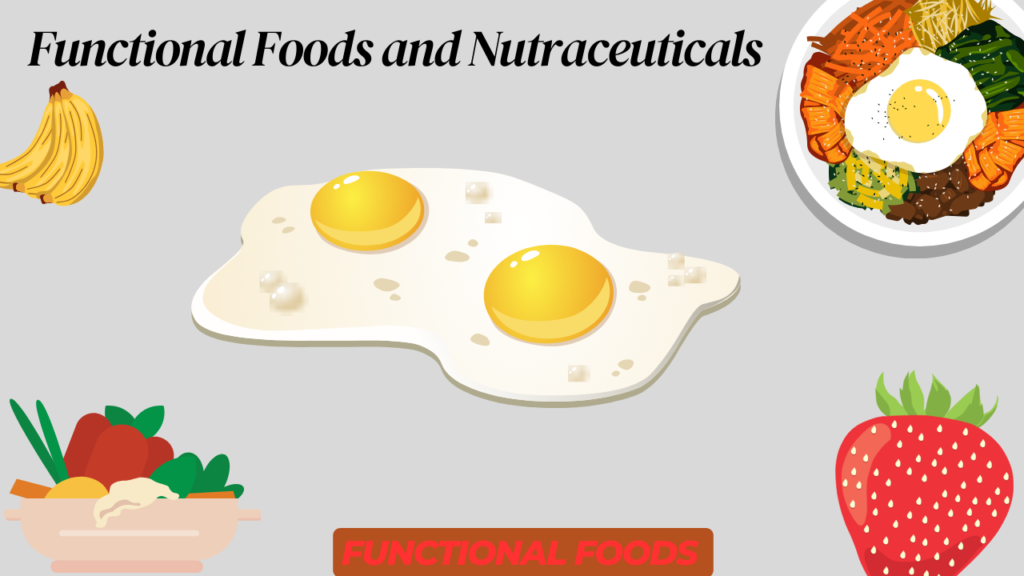Functional Foods and Nutraceuticals

Functional Foods and Nutraceuticals
Functional foods and nutraceuticals are terms that refer to food products or dietary supplements that offer potential health benefits beyond their basic nutritional value. These products are designed to promote overall well-being, prevent or manage diseases, and enhance specific physiological functions. Here’s a breakdown of these concepts:
1. Functional Foods:
• Definition: Functional foods are whole foods or fortified foods that contain bioactive compounds with health-promoting properties beyond their nutritional content.
• Examples: Probiotics, prebiotics, omega-3 fatty acids, antioxidants, fiber-enriched products, and fortified foods like calcium-fortified orange juice.
• Functions: Functional foods may provide benefits such as improved digestive health, enhanced immune function, cardiovascular health, or even mental well-being.
2. Nutraceuticals:
• Definition: Nutraceuticals are food-derived products, often in the form of dietary supplements or functional foods, that provide health benefits and contribute to the prevention and treatment of diseases.
• Examples: Vitamin and mineral supplements, herbal extracts, amino acids, and certain compounds like glucosamine and chondroitin sulfate.
• Functions: Nutraceuticals aim to address specific health issues or deficiencies and can be used for therapeutic purposes.
3. Key Features:
• Bioactive Compounds: Both functional foods and nutraceuticals contain bioactive compounds, which are substances that have specific physiological effects on the human body.
• Regulatory Considerations: The regulation of functional foods and nutraceuticals varies by country. Some regions have specific regulations governing these products to ensure their safety and efficacy.
• Prevention and Health Promotion: These products are often associated with preventive health measures and health promotion rather than simply providing basic nutrition.
4. Research and Development:
developing innovative products, and ensuring their safety and efficacy. Here are key aspects of research and development in this domain:
Identification of Bioactive Compounds:
• Researchers focus on identifying and understanding the bioactive compounds present in various foods that contribute to health benefits.
• This involves studying the mechanisms of action, bioavailability, and potential synergistic effects of these compounds.
Nutritional Epidemiology:
• Research in nutritional epidemiology explores the relationship between dietary patterns, nutrient intake, and health outcomes in populations.
• Epidemiological studies help identify potential associations between the consumption of specific functional foods or nutrients and the prevention or management of diseases.
Clinical Trials:
• Conducting controlled clinical trials is essential for assessing the safety and efficacy of functional foods and nutraceuticals.
• These trials help establish evidence-based recommendations, determine optimal dosages, and identify potential side effects.
Biotechnology and Genetic Engineering:
• Biotechnological approaches are explored to enhance the nutritional content of foods or to introduce specific bioactive compounds.
• Genetic engineering may be used to develop crops with improved nutritional profiles or to produce functional ingredients.
• Formulating products that are both palatable and effective is crucial for consumer acceptance.
Gut Microbiota Research:
• Understanding the interactions between functional foods and the gut microbiota is a growing area of research.
• Probiotics and prebiotics, for example, are studied for their impact on gut health and their potential to modulate the microbiome.
Safety and Toxicology Studies:
• Rigorous safety assessments are conducted to identify any potential adverse effects or interactions with medications.
• Toxicology studies evaluate the safety of high doses and prolonged consumption of functional ingredients.
5. Consumer Awareness:
Growing Interest:
• Increased awareness of the link between diet and health has led to a growing interest in functional foods and nutraceuticals among consumers.
Health Consciousness: As people become more health-conscious, there is an increasing awareness of the role that diet plays in overall well-being. Consumers are seeking foods that not only provide basic nutrition but also offer additional health benefits.
Preventive Healthcare: There is a shift towards preventive healthcare, with individuals seeking ways to proactively manage their health and reduce the risk of chronic diseases. Functional foods and nutraceuticals are often seen as a natural and holistic approach to health maintenance.
Aging Population: With an aging global population, there is a growing focus on products that can address age-related health concerns, such as bone health, cognitive function, and joint health. Functional foods and nutraceuticals are perceived as potential aids in promoting healthy aging.
Scientific Advances: Ongoing research in nutrition and biochemistry has led to the identification of specific bioactive compounds in foods that have health-promoting properties. This scientific understanding has fueled the development of new functional foods and nutraceuticals.
Personalized Nutrition: The concept of personalized nutrition, tailoring diets to individual needs and health goals, has gained traction. Functional foods and nutraceuticals can play a role in personalized nutrition plans, addressing specific nutritional needs or deficiencies.
Social Media and Information Access: The easy accessibility of information through social media and the internet has empowered consumers to learn more about the impact of nutrition on health. This has contributed to the demand for products that go beyond basic sustenance.
Marketing Strategies: Companies are increasingly highlighting the health benefits of their products, and marketing campaigns often focus on the functional aspects of foods and supplements. This has influenced consumer perceptions and choices.
Fitness and Wellness Trends: The popularity of fitness and wellness trends has led individuals to seek products that complement their active lifestyles. Functional foods and nutraceuticals are positioned as supportive elements in achieving fitness and wellness goals.
Regulatory Support: In some regions, regulatory bodies have established guidelines and regulations for the marketing and labeling of functional foods and nutraceuticals. This helps build consumer confidence in the safety and efficacy of these products
Educational Initiatives: Efforts are being made to educate consumers about the potential benefits and proper usage of these products.
It’s important to note that while functional foods and nutraceuticals can be beneficial, their use should be approached with caution, and individuals should consult healthcare professionals before incorporating them into Their Diets, Especially If They Have Pre-Existing Health Conditions Or Are Taking Medications.






